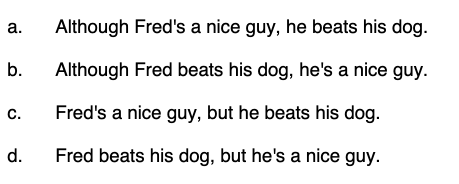Fred the dog beater
Look at the above example, the four sentences. Now, take each of those sentences and imagine you poll an audience of 100 people, asking them the following question: “Does the author want you [the reader] to give Fred either a thumbs up or thumbs up?” How do you think the audience answer? More than likely, the audience answers as follows:
a) mostly thumbs down for Fred
b) mostly thumbs down up for Fred
c) slightly more thumbs down for Fred
d) slightly more thumbs up for Fred
What the heck is going on here?
Why? Why when we present the audience with semantically equivalent sentences — but with the order of the words re-positioned — do their perceptions of Fred swing in completely opposite directions?
Three dimensions
The answer lies within how the author structures the sentences, how the author arranges (and rearranges) the words to leverage the reader’s expectations, using the following three dimensions: stress position, main clause, length (because each of the above example sentences run the same length, we won’t discuss this dimension, but just bear in mind that the longer a clause, the more the readers emphasize it). With these dimensions in mind, let’s deconstruct the first two examples. But first, let’s define the stress position.
Analysis of example (a) and example (b)
The stress position (which emphasizes certain words) sits immediately to the left of any of the three punctuation marks that denote the end of a semantic closure: a period, a semicolon; a colon. Because our examples only house a period, so let’s focus our attention there, starting with the first example: “Although Fred’s a nice guy, he beats his dog.” In this example, “he beats his dog” is the main clause and occupies the stress position. For these two reasons, the audience will generally (not always) emphasize Fred beating his dog and as a result, they give him a thumbs down. Next, moving on to the second example: “Although Fred beats his dog, he is a nice guy.” With this sentence, the author subordinated “Fred beats his dog”, reducing the sentence’s importance; “he is a nice guy” now holds the stress position and lives as the main clause. Therefore, Fred gets a thumbs up.
Leverage reader’s expectations
You can emphasize certain words within your sentences by leveraging reader’s expectations. Take advantage of the inherent structure within the English language, by applying the three simple techniques: place important (what you consider important) words in the stress position; make them the main clause; and lengthen the clause for additional for additional emphasis.
